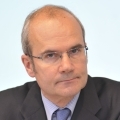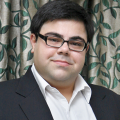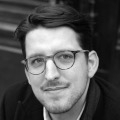The Alternative to a 'China Versus U.S.' World
Europe's Presence in the Indo-Pacific
ZURICH/PARIS, April 20, 2022 - French President Emmanuel Macron is clear on the role of France and Europe in the Indo-Pacific. At an election rally in April 2022, he said: "Who better than Europe to interfere with the duopoly that is being established between the United States and China? The role of France is not to yield to the great divisions that paralyze, but to know how to exchange with each region, each power, and have the will to build new alliances in the Indo-Pacific region."
Days before Macron’s re-election, Asia Society Switzerland and Asia Society France hosted a conversation with three experts on why France wants to be a central actor in the Indo-Pacific. We spoke with Christophe Penot, French Ambassador for the Indo-Pacific, Mohit Anand, Professor of International Business and Strategy at emlyon business school, and Joseph de Weck, Europe director at Greenmantle and author of Emmanuel Macron: Der revolutionäre Präsident.
The conversation was moderated by Valérie Terranova, acting Executive Director of Asia Society France.
Our key takeaways
France is responding to the growing assertiveness of China. China’s increased activities in the Indo-Pacific have produced major disruptions in the region and serious security challenges. One of France’s objectives is building an efficient response.
France sees the Indo-Pacific as a major growth engine. The country doesn’t just seek to protect the freedom of navigation but is also responsible for protecting the 1.6 million French citizens who live there in its overseas territories and the 400,000 French expats in the Indo-Pacific.
Last year, Macron sent warships to patrol the Taiwan straits to get China to take France’s commitment to the region seriously. The French President wants Europe to act independently from the U.S.
Macron wants to offer a multilateral alternative for a ‘China versus U.S. standoff’. Together with the European Union, France wants to promote an alternative model of cooperation between multiple partners in the Indo-Pacific, rather than seeing each player forced to make a choice between siding either with China or with the United States.
Major countries in the region do not want to be drawn into that bipolar confrontation, according to Ambassador Penot. By acting together, France, the EU, and countries in the Indo-Pacific can make a big difference in their response to global challenges.
France's strategy is not aimed against China, even though rivalry is increasing. The country wants to engage as much as it can with Beijing. As long as China considers the very notion of an Indo-Pacific region as an anti-Chinese concept, deeper engagement will be difficult, however.
France and the EU are late with their Indo-Pacific strategies, but they are now showing China that they’re in the region for the long term. Examples of this commitment are France’s developing military partnerships in the region, selling Rafale fighter jets to the United Arab Emirates and Indonesia and signing a deal with India’s navy to increase cooperation.
French engagement in the Indo-Pacific will only increase. Macron has a clear aim to establish France as a major power in the Indo-Pacific. Free trade agreements can work as a tool to increase cooperation in fields beyond trade as well, such as security policy. Crucially important, since a vast majority of Europe’s international trade passes through the Indo-Pacific.
The recently inked deal between China and the Solomon Islands, under which China can send military and police personnel to the Solomon Islands and offer intelligence support, proves, according to France, that it’s necessary to offer Indo-Pacific countries an alternative for the binary choice between China and the U.S.

Christophe Penot is the Ambassador for the Indo-Pacific, French Ministry of Foreign Affairs, since November 2020. He was previously the Ambassador of France in Australia from 2017 to 2020, and Ambassador in Malaysia from 2014 to 2017. He was also formerly the Director of Properties and Investment of the French Ministry of Foreign Affairs from 2010 to 2014, the Deputy Head of Mission of the French Embassy in Tokyo from 2005 to 2010, and was also the Deputy Head of Mission in Ottawa from 2003 to 2005. Some of his other roles include seconding to the Foreign & Commonwealth Office from 1995 to 1996, political counselor at the French Embassy in London from 1996 to 2000, First Secretary in Hanoi from 1983 to 1986. He joined the French Ministry of Foreign Affairs in January 1983. He is a chevalier de l’ordre nationale du Mérite and is a chevalier of the French Legion of Honor. He is an English and Chinese studies graduate from l’Université d’Aix-Marseille.

Mohit Anand is Professor of International Business and Strategy at emlyon business school (France). He has over 16 years of experience in industry and academia, including six years of management and consulting experience in the insurance industry with companies like Allianz and ING group. Furthermore, he has been a visiting faculty at Shri Ram College of Commerce (SRCC) University of Delhi and ESCE (Paris). His research interests include Emerging Markets, Innovation and BOP studies, with a specific focus on Microinsurance (Financial Inclusion), Frugal and Reverse Innovation. More recent areas of interest include Geopolitics in Asia, Regional Trade Blocs and Public Policy Innovations. Several of his papers have been published and presented in leading international journals and conferences. In 2018, he received Milliman Fellow in Microinsurance at ILO-ITC Impact Insurance Academy, Turin, Italy.

Joseph de Weck is the author of Emmanuel Macron: Der revolutionäre Präsident, a German-language essay on Macron’s France. He is Europe director at Greenmantle, a macroeconomic advisory firm, and a columnist with the German foreign affairs magazine Internationale Politik Quarterly. De Weck is a fellow with the Foreign Policy Research Institute and previously worked for the Swiss ministry of foreign affairs in financial and trade diplomacy. Joseph holds a BSc from the London School of Economics and a MA from Sciences Po Paris and the University of St Gallen.
